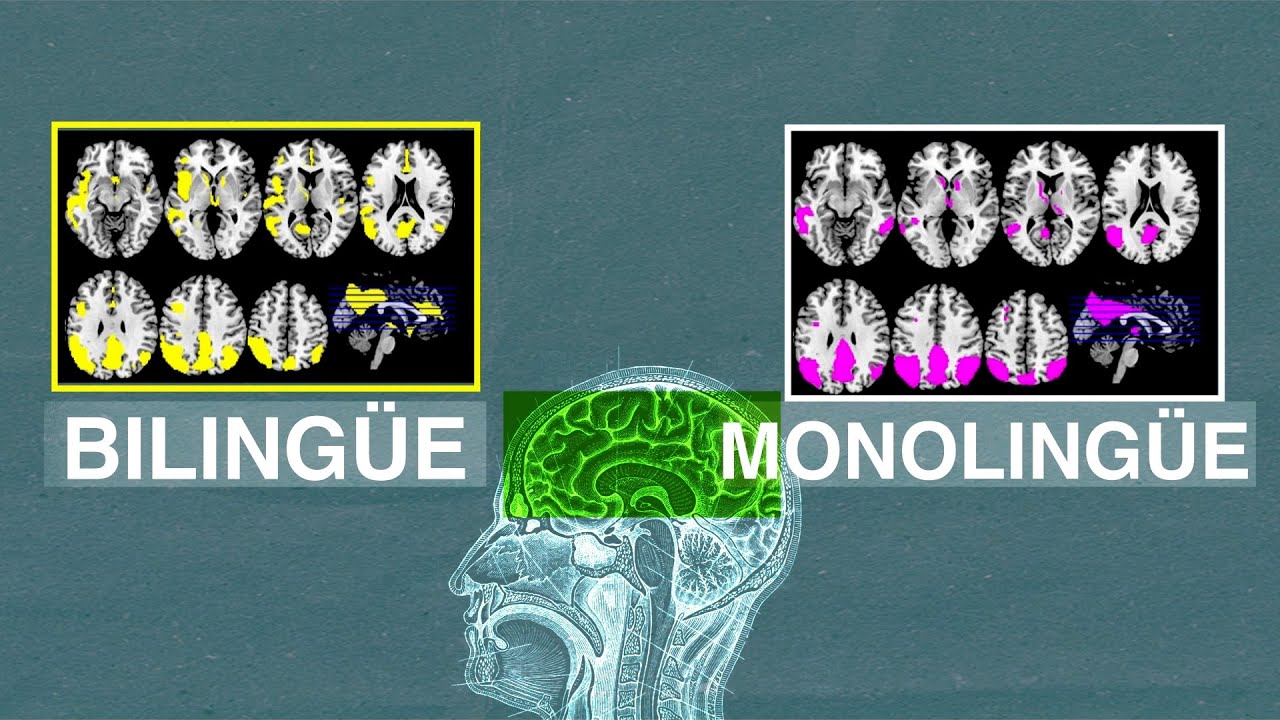Is being bilingual good for you brain? | BBC Ideas
Summary
TLDRThis script reveals the cognitive benefits of bilingualism, debunking past misconceptions. Bilinguals not only enhance concentration, problem-solving, and creativity but also delay dementia onset by 4.5 years on average. The 2007 study by Ellen Bialystok confirmed cognitive reserve, which protects against age-related cognitive decline. Learning languages, especially in childhood, builds neural networks and boosts cognitive reserve. Recent studies show early bilingualism strengthens brain connectivity at rest, and bilinguals can perceive alternate viewpoints and react differently in each language, enriching personal and societal experiences.
Takeaways
- 😌 Contrary to past beliefs, being bilingual is beneficial and not detrimental to cognitive development.
- 🏋️♂️ Learning a new language is like exercising the mind, with bilingualism enhancing concentration, problem-solving, memory, and creativity.
- 🧠 Bilingual brains have all languages active simultaneously, which involves constant mental effort and can improve cognitive functions.
- 📚 A 2007 study by Ellen Bialystok and her team found that bilingual individuals develop dementia later than monolinguals, supporting the concept of cognitive reserve.
- 💡 Cognitive reserve refers to a 'bank' of thinking abilities that protect against cognitive decline and delay dementia onset.
- 🔑 Learning a new language, especially one that is complex, can significantly boost cognitive reserve.
- 👶 The brain's plasticity allows for the formation of new neural networks when learning a language as a child.
- 🤓 Learning languages later in life involves modifying existing neural networks, which can be more challenging but potentially offer greater benefits.
- 🧐 A 2023 study at Great Ormond Street Hospital found that early bilingual children exhibited stronger connectivity in resting brain networks.
- 🌐 Bilingualism can enhance the ability to understand different perspectives and react more emotionally in one's first language and more rationally in the second.
- 🌟 The benefits of bilingualism extend beyond cognitive advantages, fostering cultural experiences and societal connections.
Q & A
What was the common misconception about bilingualism in the past?
-In the past, it was believed that being bilingual could be a disadvantage, potentially causing confusion or holding people back, especially in children.
How does learning a new language benefit the brain?
-Learning a new language is akin to exercising the mind, similar to going to the gym. It involves the continuous effort of switching between languages, which exercises the brain, improving concentration, problem-solving, memory, and creativity.
What is cognitive reserve and how does it relate to bilingualism?
-Cognitive reserve is the idea that individuals develop a reserve of thinking abilities that protect against cognitive losses due to aging and disease, and delay the onset of dementia. Bilingual people have been shown to have a larger cognitive reserve.
What significant discovery about bilingualism was made by Ellen Bialystok and her team in 2007?
-Ellen Bialystok's team discovered that bilingual individuals develop dementia on average four to 4.5 years later than those who only speak one language, confirming the concept of cognitive reserve.
What is the best time to learn a new language according to the script?
-The script suggests that learning a new language as a child involves building new neural networks, while learning later in life requires modifying existing networks and making more connections, which can be more challenging but also provide greater benefits.
What did the 2023 study at Great Ormond Street find about the brain activity of early bilinguals?
-The study found that early bilingual children had the strongest connectivity in a network at rest, which is associated with mind wandering, similar to how muscles might appear larger at rest due to regular exercise.
How does bilingualism affect a person's ability to understand different perspectives?
-Bilingualism enhances the ability to see other people's perspectives or understand that different points of view are possible, which is a lesser-known behavioral effect of being bilingual.
What emotional differences are there between reacting in one's first language versus a second language?
-Recent studies suggest that people tend to react more emotionally in their first language and more rationally in their second language, possibly due to the different contexts in which each language is learned and used.
What are some of the societal benefits of learning new languages?
-Learning new languages can open doors to new cultural experiences, life opportunities, different people, communities, and different ways of seeing the world, benefiting not just individuals but also societies.
What is the script's final message regarding the importance of learning new languages?
-The script emphasizes that learning new languages and speaking more than one language is very important for both individual and societal benefits, including cognitive advantages and cultural enrichment.
Outlines

هذا القسم متوفر فقط للمشتركين. يرجى الترقية للوصول إلى هذه الميزة.
قم بالترقية الآنMindmap

هذا القسم متوفر فقط للمشتركين. يرجى الترقية للوصول إلى هذه الميزة.
قم بالترقية الآنKeywords

هذا القسم متوفر فقط للمشتركين. يرجى الترقية للوصول إلى هذه الميزة.
قم بالترقية الآنHighlights

هذا القسم متوفر فقط للمشتركين. يرجى الترقية للوصول إلى هذه الميزة.
قم بالترقية الآنTranscripts

هذا القسم متوفر فقط للمشتركين. يرجى الترقية للوصول إلى هذه الميزة.
قم بالترقية الآنتصفح المزيد من مقاطع الفيديو ذات الصلة

The benefits of a bilingual brain - Mia Nacamulli

Why being bilingual is good for your brain | BBC Ideas

A neuroscientist explains how being bilingual makes your brain more robust

THE BILINGUAL BRAIN - Does speaking two or more languages make you smarter? | BENEFITS

Bilingualism and Speech-Language Pathology

Qué pasa en el cerebro si hablas varios idiomas
5.0 / 5 (0 votes)
